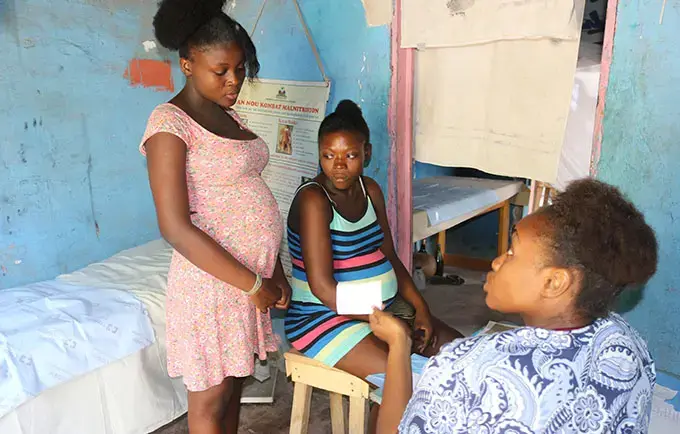Port-au-Prince, May 10, 2020 --- With the technical support of UNFPA, the United Nations Population Fund, and the financial support of “Affaires Mondiales Canada" (Canada Global Affairs), the Ministry of Public Health (MoH) closed on May 8, 2020, in Port-au-Prince a training on maternal, newborn and reproductive health services continuity for midwives and reproductive health managers in the ten departments from the country.
Midwives will have to replicate this training in the institutions where they work at the departmental level in coordination with the directorates.
According to the Director of the Department of Health Services Organization (DOOS) of the MoH, it was a question of updating participants' knowledge of the pandemic and the impact that it can have on pregnancy and health more generally. The contribution of several departments such as the Department of Epidemiology, Laboratories and Research, the Family Health Directorate and the Department of Health Promotion and Environmental Protection helped to enrich the discussions.
“Covid being a new pathology, knowledge about it can quickly become obsolete”, underlines Dr Yvrose Chrysostome to justify the relevance of this training.
Midwife at Jules Féry Hospital in Anse-à-Veaux, in the Nippes department, Natacha Alcinord sees the impact of this activity on her work at the maternity unit. "In addition to wearing a mask and washing my hands, I will be more vigilant and encourage my colleagues to be as well regarding risky behaviors in order to prevent infection with Covid-19 in particular." Miss Alcinor thinks of the flow of visits that will have to be limited, while being strict about respecting physical distance.
In addition to updating their knowledge of infection control in general and Covid-19 in particular, midwives were able to refresh their memories on issues related to ethics and community participation.
Armelle Lenescart is not assigned to a maternity hospital. Rather, she works in a community setting on the south coast of Haiti, more specifically in Roche-à-Bateau, Coteaux, Port-à-Piment and Randel, on behalf of the Catholic Relief Service (CRS). “After this training, I feel better equipped to help the community, in particular women's groups in the context of monitoring their pregnancy, to better protect themselves by overcoming taboos and by avoiding risky behaviors”, she believes.
The MoH situates this training as part of efforts to continue services in this period of health crisis caused by the Covid-19, the Director of DOOS said. Guttermarcher Institute estimates that every 10% decrease in access to maternal, newborn and reproductive health services would cause 1.7 million obstetric complications, 2.6 million neonatal complications, 28,000 maternal deaths and 168,000 additional neonatal deaths worldwide.
In Haiti each year around 300,000 births are expected, including more than 75,000 between the months of April and June 2020. It is therefore important to :
- ensure the continuity of the health care offer to women both at institutional and community level in an environment where the new prevention measures will have to generate adjustments;
- reorganize services (adaptation of prenatal services), apply alternative care-taking methods (telephone consultations for example) and accentuate community interventions.
The midwives present were able to participate, under the direction of a WHO / PAHO team, in a simulation session of dressing and undressing with personal protective equipment (PPE) https://www.youtube.com/watch?v=rcwRzccLPP4&feature=youtu.be They were also able to make concrete proposals that will allow the MoH to be able to finalize the technical guides for health institutions and health Directorates.
During a presentation by Médecins Sans Frontières / Doctors Without Borders (MSF), the role of midwives in the prevention and the medical and psychological care-taking of women survivors of sexual violence was also underlined in a social and economic context weakened by the directives of confinement, physical distance and reduction of income generating activities in the country.
“Given that during the COVID-19 pandemic, women continue to be pregnant, to give birth and to need qualified support, the promotion and continuity of reproductive and maternal and newborn health services is key to avoid an indirect over-morbidity of the Coronavirus, ” points out UNFPA through the Program Officer in maternal and newborn health, Vavita Leblanc. "The preservation of reproductive rights must be ensured even in a health crisis, including access to family planning, for the continued exercise of women's rights," she concludes.
Each participant left with a complete kit of personal protective equipment to cover the needs of at least 4 weeks of work while waiting for the widespread deployment of PPE kits at 40 institutions in 7 departments to be carried out by UNFPA in support for the needs of the MoH the following week.
Story : Vario Sérant
Photo : Samuel Laméry Pierre




